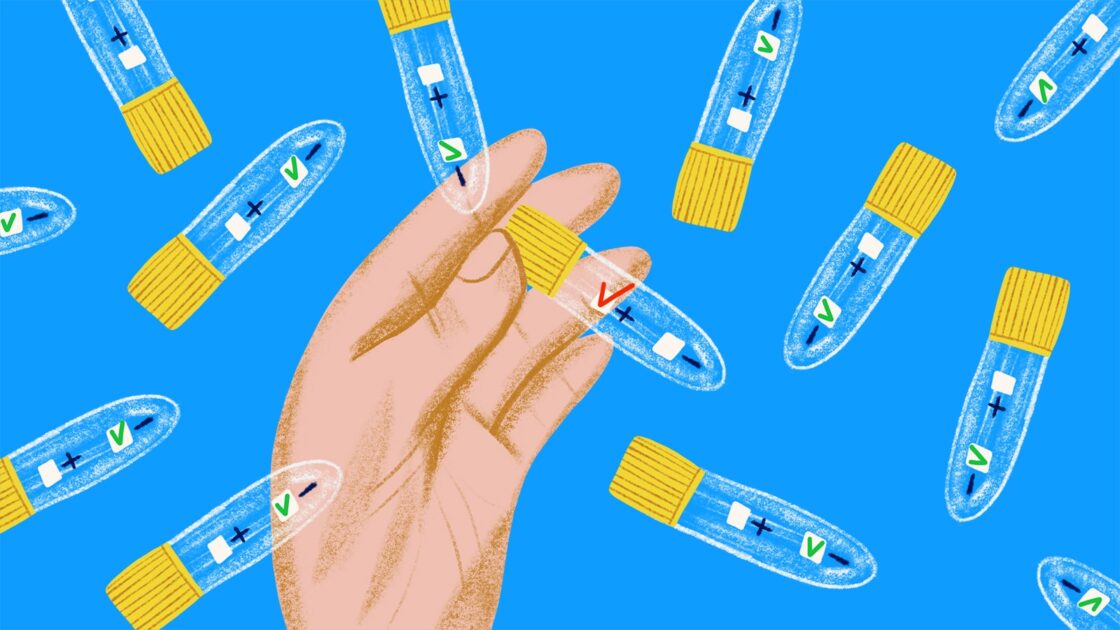How to tell your partner you have an STI
It’s important to have this conversation with all of your recent sexual partners if you find out you have an STI

If you are sexually active, there is always a risk that you could get a Sexually Transmitted Infection (STI). STIs are infections that are passed from one person to another through unprotected genital-to-genital contact, exchange of bodily fluids or through skin-to-skin contact.
Although it may seem like a difficult conversation, if you have an STI or think you may have one, it is a good idea to speak to all of your recent sexual partners to let them know.
Why should I tell someone I have an STI?
STIs are passed from one person to another during sexual activity. This means that you cannot get an STI without having it passed on to you by someone else. Sexual activity includes penetrative sex, oral sex, rubbing together and genitals touching together.
Whether you are in a committed relationship or you have more than one sexual partner, it’s important that you reach out to anyone who could have given you this infection so that they can get tested too. Letting them know that they could have an STI is also a matter of respect. There are a number of STIs that have no symptoms for some people, so there is a chance they didn’t realise they had the infection at the time, and they might still be unaware that they have an STI.
Remember, a lot of STIs can be treated with a course of antibiotics. No matter what STI you may get there is treatment available and once on it your symptoms clear up within a few weeks. If someone does not know they have an STI and it goes untreated it can cause complications over time. For this reason, it is important to let your partner/s know if you have an STI so they can also get tested and get treatment if they need it.
Can I have sex during treatment for an STI?
During the treatment period, you will need to avoid sexual contact with any partner until the treatment is finished. This is to make sure you don’t accidentally pass on the STI before your treatment is over.
If you have a regular sexual partner, you may need to explain to them why you can’t be sexually intimate during this time.
Finding out you have an STI when you’re in a relationship
Discovering you have an STI when you’re in a relationship can be a shock, especially if you have had only one sexual partner for a while. You might be worrying about where it came from and what it might mean for the relationship. You might also be worried about how your partner will react when they find out.
Whether you got the STI while in the relationship or beforehand, the best thing you can do in this situation is to have an open and honest conversation with your partner.
How to tell someone you have an STI
This may seem like a difficult conversation, but the sooner you have it, the better.
In some cases, the STI clinic may carry out ‘contact tracing’, where they will ask for a list of sexual partners you may have come into contact with when you had the STI so that they can contact them and arrange for them to get treatment. However, you may also have the option to tell these people yourself, and in some situations that might be what you prefer to do.
If you don’t know the person well or have little contact with them, then sending a message or an email is a good way of communicating this to them. If you are close with the person, or if you’re in a committed relationship, then you may want to talk in person.
Picking a time and place
There may be no ‘right time’ to have this conversation, and if you wait for the right time you may never have it. However, do try to talk at a time when both of you are unlikely to be busy or distracted. Pick somewhere quiet where you won’t be disturbed. Some people find it easier to go for a walk to have difficult conversations.
Give them the information they need
Let them know exactly what STI you were diagnosed with and try to provide them with as much information about it as you can. Let them know the symptoms (if any), how it is passed on, and how it is treated.
The nurse or doctor treating you can give you more information on the infection, and they will also be able to tell you how common it is. Let your partner know this information, and direct them to where they can find out more about STIs.
Avoid jumping to conclusions
You may have a lot of questions about where this STI came from, and if you’re in a relationship, then you could possibly be feeling betrayed or hurt. It’s worth remembering that if neither of you had an STI test at the beginning of your relationship, then there is a chance that one of you could have had it before you got together.
Ask your partner to be honest with you about how they think this happened, but try not to accuse them of anything before exploring all of the possibilities.
Let them know what to do next
Now that they know about the STI, it’s important that they go for a check up, especially if you’re not sure who you could have gotten it from. If it wasn’t from them, then you could have passed it to them, and they could need treatment.
Tell them where you went for your STI test, or send them this list of free STI clinics across Ireland.
What to do if they get upset
There is a chance that the person you’re speaking to will get upset or even angry. Remind them that ultimately it can be difficult to know where an infection has come from or how long a person has had it and blaming each other isn’t necessarily going to help. You are telling them now so that they can get any treatment they might need.
If you are not close to the person, then you can leave it there and let them decide what steps to take next. If this is a regular partner or someone you’re in a relationship with, then it might help to give them some space to calm down, and then you can come back to talk it out.
One of us cheated
Although an STI is not always a sign that one partner was unfaithful to the other, this sometimes can be the case. If you have cheated on your partner, the best thing you can do is to be honest.
If your partner has cheated on you, then you may be feeling a lot of emotions right now. Take time to work out how you feel, and sit down to have an open conversation with your partner.
How can I protect myself against STIs?
There are many great options to help protect your sexual health, but none of them are 100% effective. Even if you use condoms every time you have penetrative sex, you are still at risk of getting genital warts and herpes, as these can be passed through skin-to-skin contact. Going for an STI check or taking a home STI testing kit with a partner before having sex, can be a great way of protecting yourself and those you have sex with against STIs and HIV. However, not all STI checks check for all STIs, so it is important to speak to your healthcare provider and ask them what is being tested for as part of your screening.
Discussing with your sexual partners the type of contraception or protection options available to you, and agreeing on a type that works for everyone involved can help to reduce the risk of pregnancy, STIs and HIV. Looking out for sores or symptoms on a partner’s genitals before having sex with them, can help to identify STIs that they may not be aware of. If you do see any signs that someone may have an STI, do not have sex with them until you know for certain it is safe to do so. Asking someone about their sexual health history is the responsible thing to do before having sex, and it should not be taken as an insult if someone asks you about yours.
Looking after your mental health after an STI diagnosis
If you are diagnosed with an STI, you might feel a mixture of emotions. Unfortunately, there is still stigma in our society surrounding STIs that can cause some people to feel shame about having one. However, like any other healthcare diagnosis, you are not to blame for your STI and have not done anything “wrong”. Being diagnosed with an STI can have a negative impact on your mental health and wellbeing and if you don’t feel comfortable telling friends or family about it, you might feel isolated and alone. If you have found out you have an STI and you’re finding it difficult to cope, there are things you can do to support your mental health.
- Remember that STIs are common and lots of people have one at some point in their life, even though they aren’t talked about a lot
- Take time out to do something you enjoy and practice self-care
- Reach out for mental health support if you need it. If you don’t feel comfortable talking to a friend or family member, our 24/7 anonymous text service can help
- Be patient with yourself and allow yourself to feel your emotions. It’s ok to be upset when you find out you need healthcare treatment. It’s important to take the time you need to adjust
Illustrations by Marina Marinina.
Feeling overwhelmed and want to talk to someone?
- Get anonymous support 24/7 with our text message support service
- Connect with a trained volunteer who will listen to you, and help you to move forward feeling better
- Whatsapp us now or free-text SPUNOUT to 50808 to begin.
- Find out more about our text message support service
If you are a customer of the 48 or An Post network or cannot get through using the ‘50808’ short code please text HELLO to 086 1800 280 (standard message rates may apply). Some smaller networks do not support short codes like ‘50808’.





